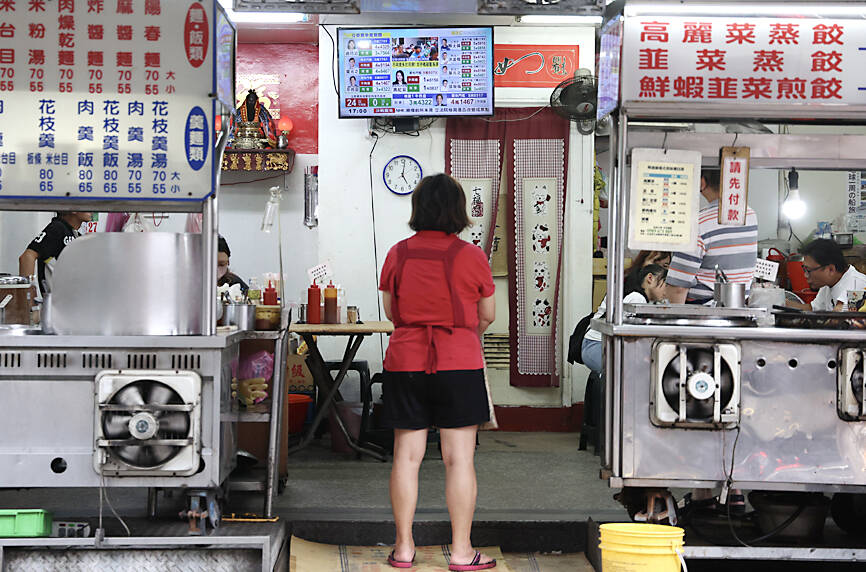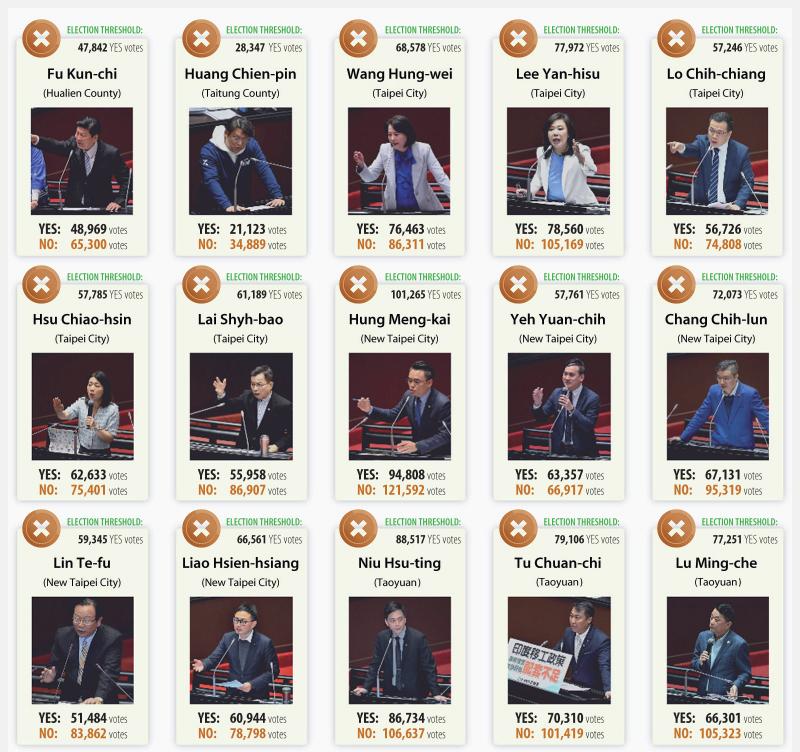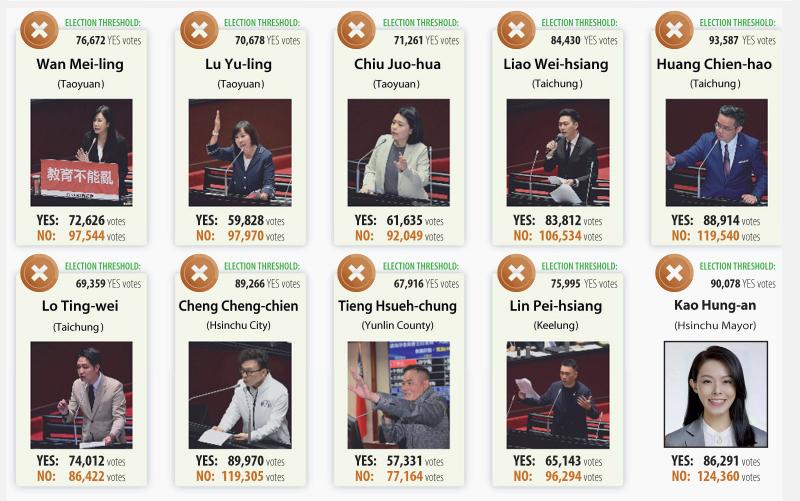The results of recall votes yesterday dealt a blow to the Democratic Progressive Party’s (DPP) efforts to overturn the opposition-controlled legislature, as all 24 Chinese Nationalist Party (KMT) lawmakers survived the recall bids.
Backed by President William Lai’s (賴清德) DPP, civic groups led the recall drive, seeking to remove 31 out of 39 KMT lawmakers from the 113-seat legislature, in which the KMT and the Taiwan People’s Party (TPP) together hold a majority with 62 seats, while the DPP holds 51 seats.
The scale of the recall elections was unprecedented, with another seven KMT lawmakers facing similar votes on Aug. 23.

Photo: CNA
For a lawmaker to lose their seat, the number of votes in favor of recalling them must exceed those against, and must be more than 25 percent of the total number of registered voters in the electorate.
Recall votes against suspended Hsinchu Mayor Ann Kao (高虹安), formerly a member of the TPP, as well as all 24 KMT lawmakers failed to pass, with most losing by sizeable margins, Central Election Commission (CEC) figures showed.
In Taipei, people lined up in school hallways and temples. Agence France-Presse saw an elderly man arrive at an elementary school in an ambulance, which had brought him from a hospital so he could vote.

Photo: CNA
Public opinion had been divided over the recalls, which have dominated newspaper headlines and social media feeds for months.
“I am not satisfied with their job performance,” retired doctor Jeremy Chen, 54, said, adding that he was “also worried about the pro-China stance of some lawmakers.”
However, a 46-year-old man surnamed Lee said the lawmakers had not “committed any crimes” and that the DPP wanted to control the legislature for “its one-party dominance.”

Source: CEC
“That is not democracy,” Lee said after voting against the recall.
If next month’s recall votes also fail, the outcome would signal that the Lai government could continue to face strong resistance from within the legislature before the next legislative elections, which are expected to take place in 2028.
Political analyst Lev Nachman said that whatever the outcome, political divisions in Taiwan were certain to deepen.

Source: CEC
“The way that the recalls have played out have been perhaps some of the most divisive language used toward both camps that I think I’ve ever seen,” Nachman said.
Over the past few months, KMT Chairman Eric Chu (朱立倫) has compared Lai’s government to Adolf Hitler’s Nazi regime, while Lai, who is the DPP chairman, has spoken of “removing impurities” to defend Taiwan’s sovereignty.
Beijing has loomed large over the recall vote, with Taipei warning of “visible evidence” that China was trying to interfere in the process.
The KMT’s ties with Beijing and frequent visits by its lawmakers to China have raised concerns among critics over Chinese influence on the party.
However, the KMT has rejected accusations that it is beholden to Beijing, and insists that dialogue with China is needed to ensure peace.
Meanwhile, Kao’s survival yesterday means that the DPP would not be able to take hold of the city.
Had the recall succeeded, the Cabinet would have appointed an acting mayor, because Kao has less than half of her four-year term remaining, which would have allowed the central government to take control of the city’s administration.
“Because of you, I feel that I am definitely not alone,” Kao said at a post-vote news conference.
Kao is appealing a sentence of seven years and four months, after she was found guilty of corruption in July last year.
She was suspended as Hsinchu mayor soon after.

MAKING WAVES: China’s maritime militia could become a nontraditional threat in war, clogging up shipping lanes to prevent US or Japanese intervention, a report said About 1,900 Chinese ships flying flags of convenience and fishing vessels that participated in China’s military exercises around Taiwan last month and in January last year have been listed for monitoring, Coast Guard Administration (CGA) Deputy Director-General Hsieh Ching-chin (謝慶欽) said yesterday. Following amendments to the Commercial Port Act (商港法) and the Law of Ships (船舶法) last month, the CGA can designate possible berthing areas or deny ports of call for vessels suspected of loitering around areas where undersea cables can be accessed, Oceans Affairs Council Minister Kuan Bi-ling (管碧玲) said. The list of suspected ships, originally 300, had risen to about

DAREDEVIL: Honnold said it had always been a dream of his to climb Taipei 101, while a Netflix producer said the skyscraper was ‘a real icon of this country’ US climber Alex Honnold yesterday took on Taiwan’s tallest building, becoming the first person to scale Taipei 101 without a rope, harness or safety net. Hundreds of spectators gathered at the base of the 101-story skyscraper to watch Honnold, 40, embark on his daredevil feat, which was also broadcast live on Netflix. Dressed in a red T-shirt and yellow custom-made climbing shoes, Honnold swiftly moved up the southeast face of the glass and steel building. At one point, he stepped onto a platform midway up to wave down at fans and onlookers who were taking photos. People watching from inside

Japan’s strategic alliance with the US would collapse if Tokyo were to turn away from a conflict in Taiwan, Japanese Prime Minister Sanae Takaichi said yesterday, but distanced herself from previous comments that suggested a possible military response in such an event. Takaichi expressed her latest views on a nationally broadcast TV program late on Monday, where an opposition party leader criticized her for igniting tensions with China with the earlier remarks. Ties between Japan and China have sunk to the worst level in years after Takaichi said in November that a hypothetical Chinese attack on Taiwan could bring about a Japanese

STREAMLINED: The dedicated funding would allow the US to transfer equipment to Taiwan when needed and order upgraded replacements for stockpiles, a source said The US House of Representatives on Thursday passed a defense appropriations bill totaling US$838.7 billion, of which US$1 billion is to be allocated to reinforcing security cooperation with Taiwan and US$150 million to replace defense articles provided to the nation. These are part of the Consolidated Appropriation Act, which the US House yesterday passed with 341 votes in favor and 88 against. The act must be passed by the US Senate before Friday next week to avoid another government shutdown. The US House Committee on Appropriations on Monday unveiled the act, saying that it allocates US$1 billion for the Taiwan Security Cooperation Initiative